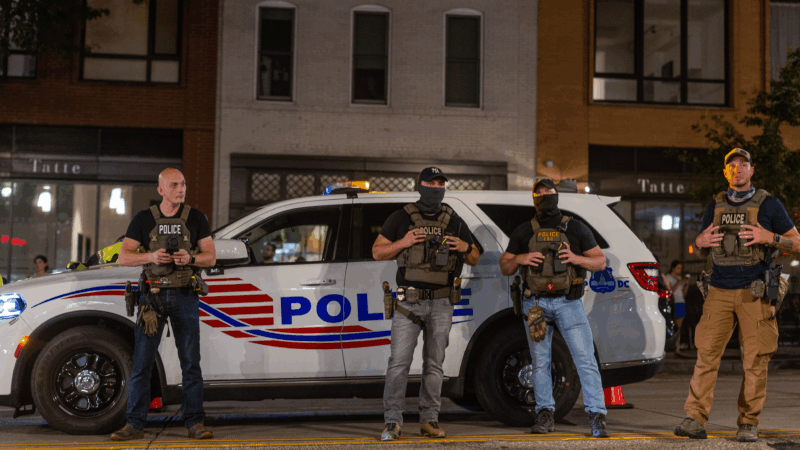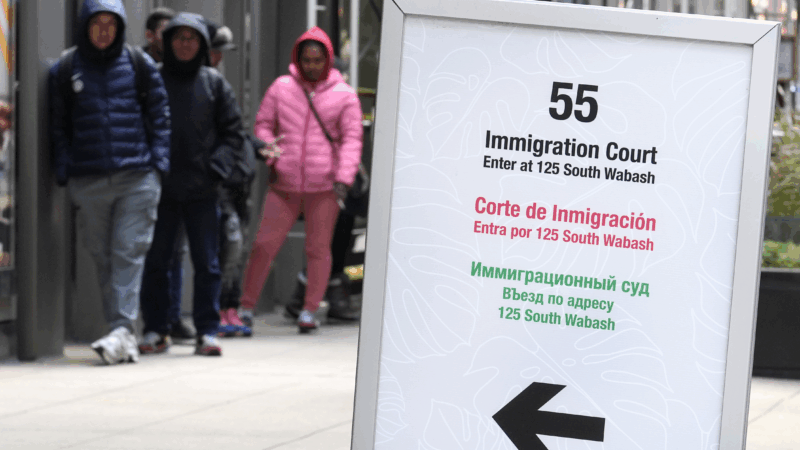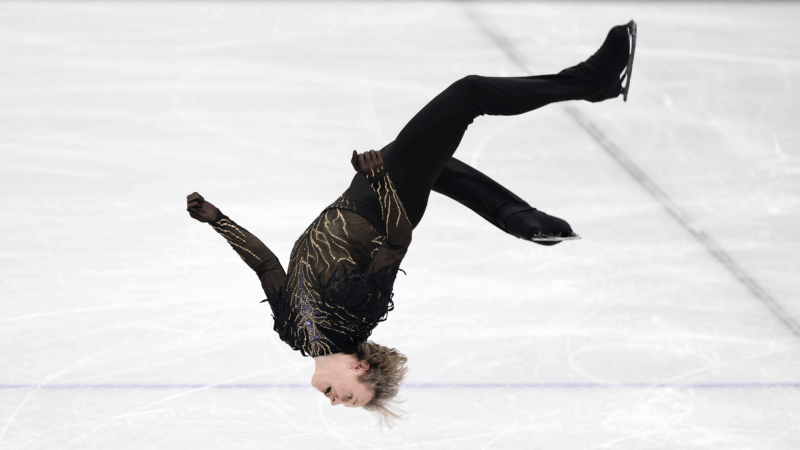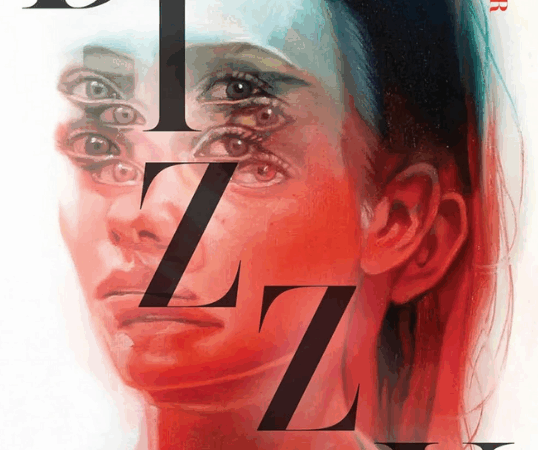Teenagers in Washington D.C. say the federal police takeover makes them feel unsafe
WASHINGTON — Marek Deca arrived here earlier this month for his first year of college at Howard University.
“It’s a new environment away from home, away from family. You’re already going to feel some type of way,” the 18-year-old said.
Deca says he expected to feel nervous about normal freshman stuff, like his classes and making friends. He did not expect to feel nervous about all the federal forces roaming the city.
He said he has seen federal police officers patrolling near Howard’s campus, and that feels unsafe.
“We’re young, we want to go outside, we want to have fun in a new area and we’re afraid to go out because we’re afraid, one wrong step, one wrong move, off the crosswalk and I’m getting flagged down for something,” he said.
That fear began Monday with President Trump’s announcement that he was sending in the National Guard and taking over the D.C. Metropolitan Police Department.
On Friday, D.C. officials fought back.
The Attorney General for the district sued the federal government, saying Trump’s actions amounted to a hostile takeover. Late Friday, after pressure from a federal judge, the Justice Department withdrew its bid to name an “emergency police chief” and said — at least for now — Washington’s police chief will keep control of the D.C. police force.
Caught in the middle of all this are the district’s young people.
At the press conference announcing the move on Monday, Trump described “roving mobs of wild youth.” The U.S. Attorney for D.C., Jeanine Pirro, spoke of “young punks” and advocated for harsher punishments.

But NPR spoke with youth in the district and the adults who work directly with them. They said it was the federal takeover that made them feel unsafe, not the crime in the district.
“When I found out I was worried,” says Kenneth, a 16-year-old who lives in southeast D.C., one of the areas in the city that has more violent crime than the citywide average. “Now you gotta worry about what might happen.”
NPR is not using his last name — or any other last names for the teenagers under 18 in this story — because they feared retribution from the Trump administration.
Ali, also 16, says he was open to the idea of more policing, but didn’t feel they could be trusted to actually protect residents.
“I understand public safety is important, but they look more like they’re bullying us than being our community guardians,” Ali said. “It’s hard not to feel intimidated. And it also made me think a lot about what real safety means and whether it comes from trust or from force and fear.”
Makayla, another 16-year-old from southeast D.C., echoed the idea that some types of police work could feel helpful, particularly the juvenile curfew that went into effect in part of the city. Though she also felt like small groups of young people were making life harder for everyone else.
“As a teenager, you want to go out and enjoy yourself,” she said. “But all y’all want to do is fight.”
The district did see a violent crime spike in 2023, and youth crime was part of that. But since then, violent crime in general has been falling, and youth crime appears to be down too.

Kristin Henning, director of the Juvenile Justice Clinic and Initiative at Georgetown University Law Center, says even if the numbers were increasing, such a crackdown isn’t necessary. “We’re punishing the whole of black youth in our city for the mistakes or misdeeds of a very, very small percentage of young people who are engaged in this type of behavior,” she said.
The young people involved in D.C.’s juvenile justice system are disproportionately black boys.
Henning says her clinic has already received worried phone calls from youth this week. One girl said she was put in handcuffs because she matched a description of someone else. She was eventually released. The MPD did not respond to a request for comment on the matter.
“She called our office to say, you know, this is what they are doing to us. That’s her perspective. Whether that officer was responding to this new executive order, it does not matter,” she said.
Henning says many of the young people who do commit crimes are victims of trauma. In fact, a 2022 study by the D.C. Criminal Justice Coordinating Council said as much: Youth involved with the juvenile justice system were more likely to be homeless, to have experienced abuse or neglect, to have missed school, and to live in an area with more gun violence.
Research shows treating violent crime like a public health problem — addressing things like housing, food insecurity, unemployment, and mental health — is effective in lowering it.
“The response is rarely, ‘What caused this? How can we change the conditions under which this person or these people made this choice?'” says Naïké Savain, co-executive director of the Black Swan Academy, which runs civic programming for Black youth in D.C.
Tyela, a 17-year-old high school senior, agrees, saying that people in her neighborhood need better mental health care, better housing, and more recreation centers.
“They would not be out here shooting people or in beef if they had somewhere to go,” said Tyela, who added that she has known people killed by gun violence.
She feels like Trump’s police takeover is not going to solve the problem of crime in her neighborhood. Normally, she’d want to protest the action.
“But at the same time, after all of these things are going on, it’s like, how is it going to change? How is the way that I advocate for myself going to change? Am I still going to be able to do it as much?” she said.
Now, she said, she’s a little afraid to.
Lindsey Vonn says she suffered ‘complex tibia fracture’ in her Olympic downhill crash
The 41-year-old star said her torn ACL was not a factor in her crash. "While yesterday did not end the way I had hoped, and despite the intense physical pain it caused, I have no regrets," she wrote.
Guerilla Toss embrace the ‘weird’ on new album
On You're Weird Now, the band leans into difference with help from producer Stephen Malkmus.
Nancy Guthrie search enters its second week as a purported deadline looms
"This is very valuable to us, and we will pay," Savannah Guthrie said in a new video message, seeking to communicate with people who say they're holding her mother.
Immigration courts fast-track hearings for Somali asylum claims
Their lawyers fear the notices are merely the first step toward the removal without due process of Somali asylum applicants in the country.
Ilia Malinin’s Olympic backflip made history. But he’s not the first to do it
U.S. figure skating phenom Ilia Malinin did a backflip in his Olympic debut, and another the next day. The controversial move was banned from competition for decades until 2024.
‘Dizzy’ author recounts a decade of being marooned by chronic illness
Rachel Weaver worked for the Forest Service in Alaska where she scaled towering trees to study nature. But in 2006, she woke up and felt like she was being spun in a hurricane. Her memoir is Dizzy.






